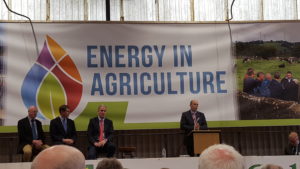Irish Renewable Heat Incentive – coming soon (we hope!)
It’s been talked about for several years now but it appears that there will be a firm announcement about the launch of a Renewable Heat Incentive (RHI) in Ireland – soon. That’s the news from this weeks Energy in Agriculture conference and trade fair that took place at Gurteen College in Tipperary. We were there to talk about the UK perspective on biomass sustainability and plug our compliance scheme the Sustainable Fuel Register (SFR). You can see our presentation here.
This excellent event was opened by Denis Naughten, the Minsiter for Communications, Climate Action and the Environment (DCCAE) who declared that the detail of the long awaited RHI would be put before the Irish Government within 2-3 weeks and formally announced at the National Ploughing Championships on the 19-21 September.
It can’t come soon enough as the Irish Government has little chance of meeting their Renewable Energy Directive target for 12% renewable heat by 2020. As a result, most commentators are convincd that the country will have to pay a hefty fine to the EU. The past delays and lack of any clear direction on renewable heat has put countless projects on hold pending the support anticipated. However, the Minister and other DCCAE officials stated that it was important to ensure that the scheme was fair and that they learned clear lessons from other RHI’s in Great Britain and Northern Ireland. The NI RHI and the “Cash for Ash” scandal would certainly account for some of the reservations of the Irish Government as this poorly designed scheme was infamous for being easily exploited for monetary reward at the expense of tax payers with little environmnetal gain.

Kevin Lindegaard of Crops for Energy talking to Minsiter Naughten and Barry Caslin of Teagasc about biomass sustainability.
There was scant detail in his speech but Mr Naughten did say that one of the key aims of the RHI scheme would be to develop the supply chain for 110,000 tonnes of indigenous fuel from energy crops such as willow, miscanthus and eucalyptus as well as residues from woodland production. This is equivalent to 300 tonnes of fuel per day. Considering Ireland imports 88% of its energy needs in the form of fossil fuel and the only large scale indigenous energy form is the unsustainable burning of peat, this is good news and should provide a boost to energy crop growers and farmers looking to diversify away from loss making ventures (such as beef). The drive towards achieving this aim will be led by a new initiative – Bord Na Mona BioEnergy which was formally launched at the conference.
Some farmers were muttering (and even shouting) that they’ve heard it all before. Indeed, until there is full clarity on the detail there will remain scepticism in large quarters. However, one hopes that the wait will ve worth it in the end. We will keep you posted.
